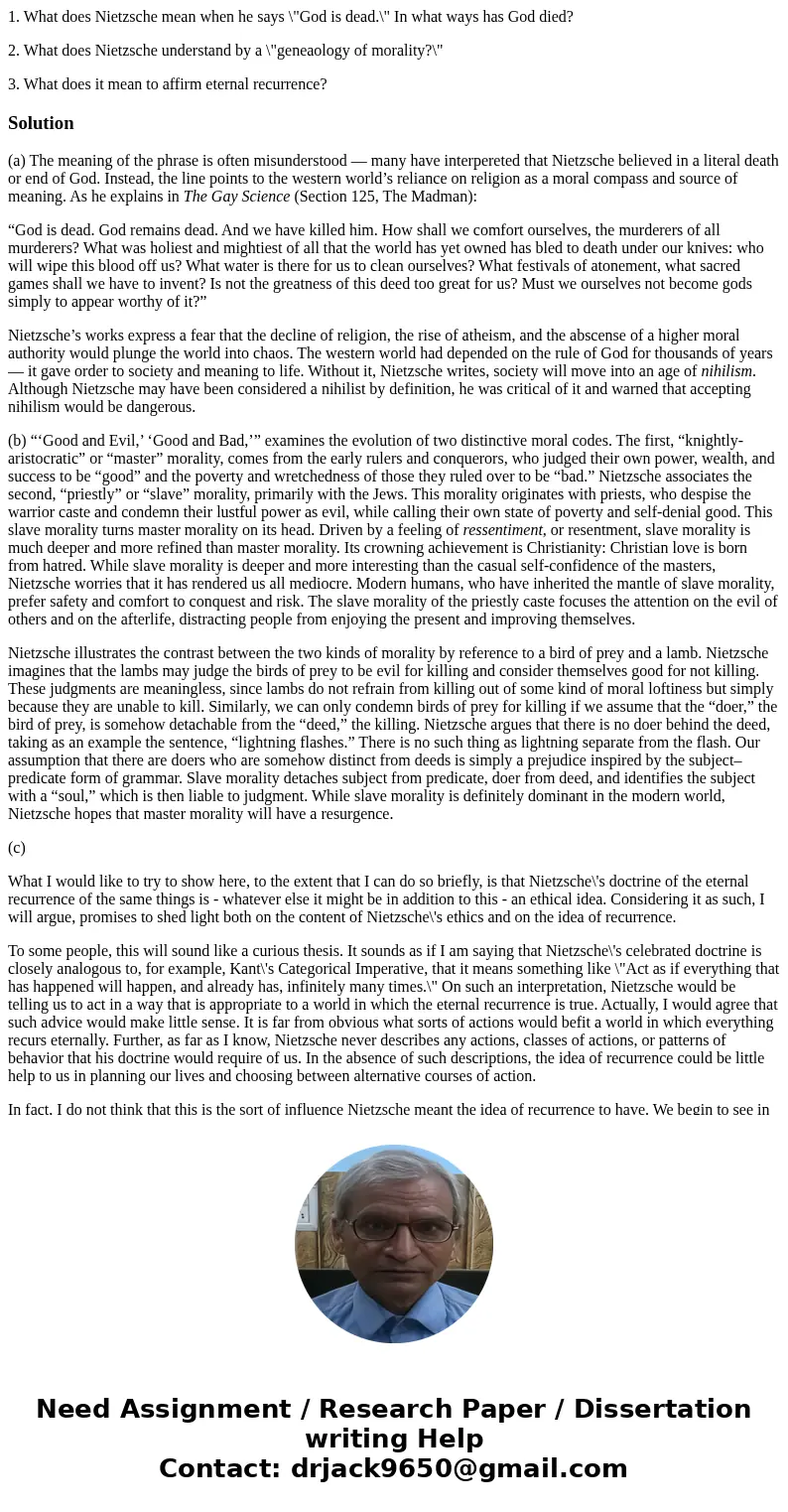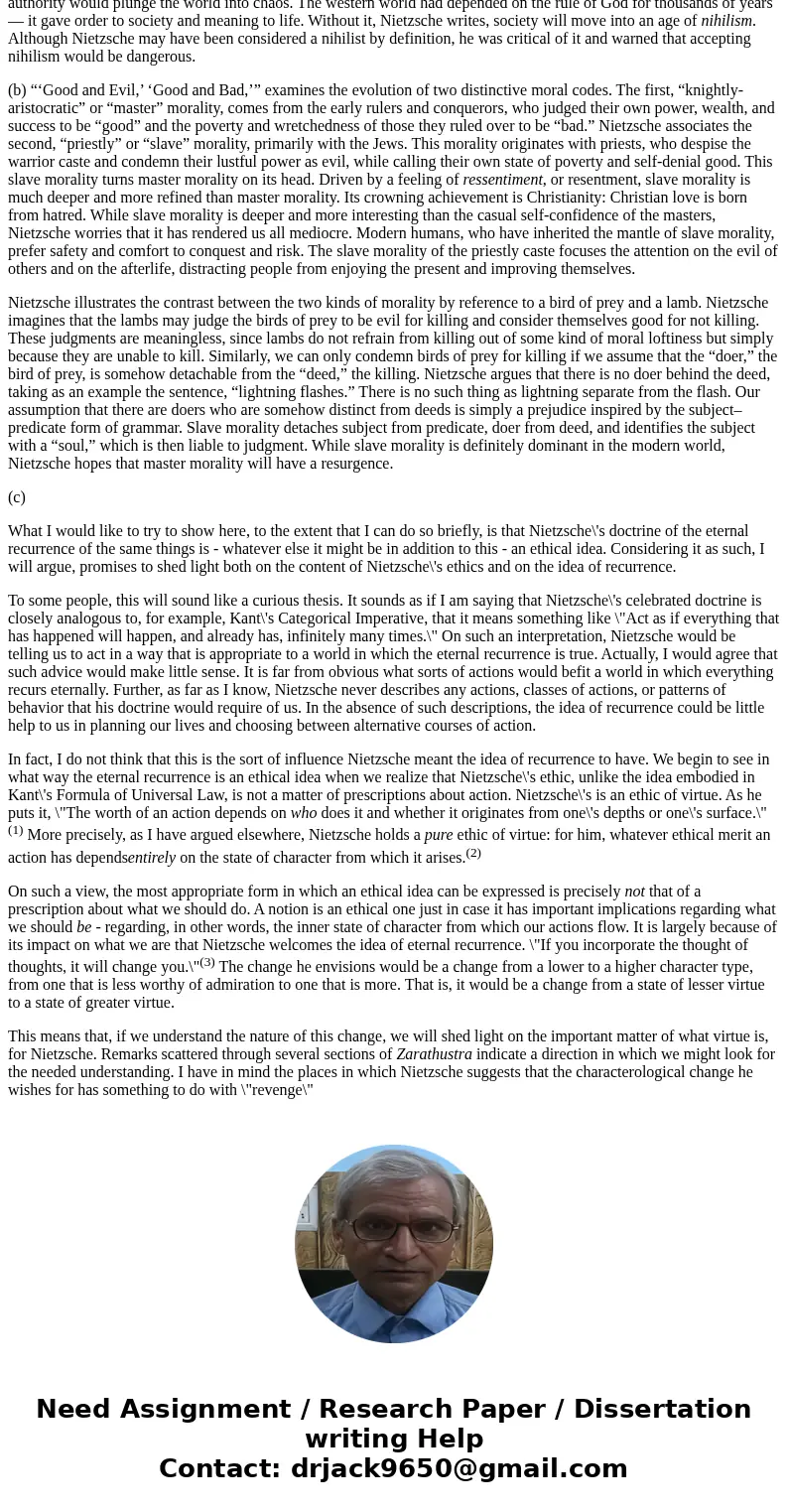1 What does Nietzsche mean when he says God is dead In what
1. What does Nietzsche mean when he says \"God is dead.\" In what ways has God died?
2. What does Nietzsche understand by a \"geneaology of morality?\"
3. What does it mean to affirm eternal recurrence?
Solution
(a) The meaning of the phrase is often misunderstood — many have interpereted that Nietzsche believed in a literal death or end of God. Instead, the line points to the western world’s reliance on religion as a moral compass and source of meaning. As he explains in The Gay Science (Section 125, The Madman):
“God is dead. God remains dead. And we have killed him. How shall we comfort ourselves, the murderers of all murderers? What was holiest and mightiest of all that the world has yet owned has bled to death under our knives: who will wipe this blood off us? What water is there for us to clean ourselves? What festivals of atonement, what sacred games shall we have to invent? Is not the greatness of this deed too great for us? Must we ourselves not become gods simply to appear worthy of it?”
Nietzsche’s works express a fear that the decline of religion, the rise of atheism, and the abscense of a higher moral authority would plunge the world into chaos. The western world had depended on the rule of God for thousands of years — it gave order to society and meaning to life. Without it, Nietzsche writes, society will move into an age of nihilism. Although Nietzsche may have been considered a nihilist by definition, he was critical of it and warned that accepting nihilism would be dangerous.
(b) “‘Good and Evil,’ ‘Good and Bad,’” examines the evolution of two distinctive moral codes. The first, “knightly-aristocratic” or “master” morality, comes from the early rulers and conquerors, who judged their own power, wealth, and success to be “good” and the poverty and wretchedness of those they ruled over to be “bad.” Nietzsche associates the second, “priestly” or “slave” morality, primarily with the Jews. This morality originates with priests, who despise the warrior caste and condemn their lustful power as evil, while calling their own state of poverty and self-denial good. This slave morality turns master morality on its head. Driven by a feeling of ressentiment, or resentment, slave morality is much deeper and more refined than master morality. Its crowning achievement is Christianity: Christian love is born from hatred. While slave morality is deeper and more interesting than the casual self-confidence of the masters, Nietzsche worries that it has rendered us all mediocre. Modern humans, who have inherited the mantle of slave morality, prefer safety and comfort to conquest and risk. The slave morality of the priestly caste focuses the attention on the evil of others and on the afterlife, distracting people from enjoying the present and improving themselves.
Nietzsche illustrates the contrast between the two kinds of morality by reference to a bird of prey and a lamb. Nietzsche imagines that the lambs may judge the birds of prey to be evil for killing and consider themselves good for not killing. These judgments are meaningless, since lambs do not refrain from killing out of some kind of moral loftiness but simply because they are unable to kill. Similarly, we can only condemn birds of prey for killing if we assume that the “doer,” the bird of prey, is somehow detachable from the “deed,” the killing. Nietzsche argues that there is no doer behind the deed, taking as an example the sentence, “lightning flashes.” There is no such thing as lightning separate from the flash. Our assumption that there are doers who are somehow distinct from deeds is simply a prejudice inspired by the subject–predicate form of grammar. Slave morality detaches subject from predicate, doer from deed, and identifies the subject with a “soul,” which is then liable to judgment. While slave morality is definitely dominant in the modern world, Nietzsche hopes that master morality will have a resurgence.
(c)
What I would like to try to show here, to the extent that I can do so briefly, is that Nietzsche\'s doctrine of the eternal recurrence of the same things is - whatever else it might be in addition to this - an ethical idea. Considering it as such, I will argue, promises to shed light both on the content of Nietzsche\'s ethics and on the idea of recurrence.
To some people, this will sound like a curious thesis. It sounds as if I am saying that Nietzsche\'s celebrated doctrine is closely analogous to, for example, Kant\'s Categorical Imperative, that it means something like \"Act as if everything that has happened will happen, and already has, infinitely many times.\" On such an interpretation, Nietzsche would be telling us to act in a way that is appropriate to a world in which the eternal recurrence is true. Actually, I would agree that such advice would make little sense. It is far from obvious what sorts of actions would befit a world in which everything recurs eternally. Further, as far as I know, Nietzsche never describes any actions, classes of actions, or patterns of behavior that his doctrine would require of us. In the absence of such descriptions, the idea of recurrence could be little help to us in planning our lives and choosing between alternative courses of action.
In fact, I do not think that this is the sort of influence Nietzsche meant the idea of recurrence to have. We begin to see in what way the eternal recurrence is an ethical idea when we realize that Nietzsche\'s ethic, unlike the idea embodied in Kant\'s Formula of Universal Law, is not a matter of prescriptions about action. Nietzsche\'s is an ethic of virtue. As he puts it, \"The worth of an action depends on who does it and whether it originates from one\'s depths or one\'s surface.\"(1) More precisely, as I have argued elsewhere, Nietzsche holds a pure ethic of virtue: for him, whatever ethical merit an action has dependsentirely on the state of character from which it arises.(2)
On such a view, the most appropriate form in which an ethical idea can be expressed is precisely not that of a prescription about what we should do. A notion is an ethical one just in case it has important implications regarding what we should be - regarding, in other words, the inner state of character from which our actions flow. It is largely because of its impact on what we are that Nietzsche welcomes the idea of eternal recurrence. \"If you incorporate the thought of thoughts, it will change you.\"(3) The change he envisions would be a change from a lower to a higher character type, from one that is less worthy of admiration to one that is more. That is, it would be a change from a state of lesser virtue to a state of greater virtue.
This means that, if we understand the nature of this change, we will shed light on the important matter of what virtue is, for Nietzsche. Remarks scattered through several sections of Zarathustra indicate a direction in which we might look for the needed understanding. I have in mind the places in which Nietzsche suggests that the characterological change he wishes for has something to do with \"revenge\"


 Homework Sourse
Homework Sourse